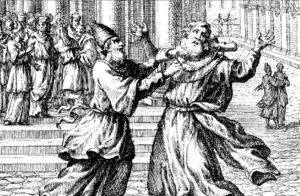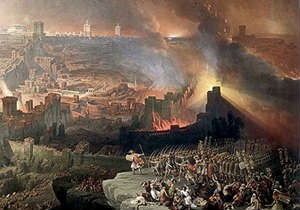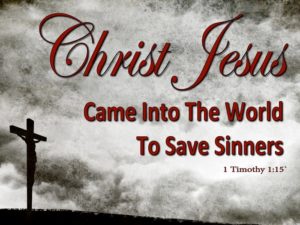TODAY’S READING FROM THE OLD TESTAMENT- JEREMIAH 28:1-29:32
Jeremiah is wearing the yoke as a symbol of the submission to King of Babylon that the Lord is requiring of Judah at this time. The false prophet, Hananiah, makes a prediction that the Lord will break the yoke of Nebuchadnezzar, king of Babylon, off the neck of all the nations within two years. He prophesies that the stolen items from the temple will be quickly restored after their brief exile. Quite dramatically Hananiah takes the yoke off Jeremiah’s neck and breaks it.
Jeremiah replies that if a person claims to be a prophet and makes a prophecy that fails to come true, he is a false prophet. Furthermore, the Lord says that, contrary to Hananiah’s prophecy, He will put an iron yoke on the nations in place of the wooden one and extend Nebuchadnezzar’s control over many nations, even wild animals. Jeremiah sticks with his prophecy that the people of Judah will be in captivity for 70 years and that Hananiah would die before the year is out.
In Chapter 29, Jeremiah writes a letter to the surviving elders, priests and prophets among the exiles in Babylon. He tells them to seek the good of the city, build houses, plant gardens, and carry on with life. They are to pray on behalf of its residents. “Pray for the prosperity of the city, for if the city prospers so will you” (Jer 29:7).
In the letter Jeremiah assures them that the Lord’s promise is to bring them back after 70 years. The promise that is so glibly quoted, “I know the plans I have for you”, declares the Lord, “plans to prosper you and not to harm you, plans to give you a hope and a future,” (Jeremiah 29:11) are written to assure them that, although they will be taken captive into Babylon, a remnant from the next generation will see a return to the land and have their relationship with the Lord restored.
Jeremiah 29:11 is one of the most misapplied verses in the Bible. Certainly, the words in themselves are encouraging. But we must remember to whom this promise was given and the historical context. This is not meant to be a blanket promise of worldly prosperity and blessing. Judah was about to experience the promised curse of a 70-year captivity for their years of disobedience to God. They would not be let off the hook, but would be held accountable for their sins and delivered to Nebuchadnezzar to live in exile. In the future, after 70 years, a returning remnant would be blessed. It is unlikely that many of the older ones would be alive to experience the promised hope of a future return to Jerusalem.
Better for us to take the promises that are directed towards us, such as Ephesians 1:3!
Ephesians 1:3 3 Blessed be the God and Father of our Lord Jesus Christ, who has blessed us with every spiritual blessing in the heavenly places in Christ.
Jeremiah predicts that the false prophets, Ahab, son of Kolaiah, and Zedekiah, son of Maaseiah, will be delivered to Nebuchadnezzar and put to death before their eyes. Their immorality and lies will cause their names to be remembered in a curse (Jer 29:22-23).
Shemaiah, the Nehelamite, prophesies falsely, even though he has no word from the Lord. Jeremiah gives a message to all the exiles exposing Shemaiah as a false prophet, and pronouncing that he and his people will quickly come to an end because they have preached rebellion.
TODAY’S READING FROM THE NEW TESTAMENT – 1 TIMOTHY 1:1-20
Today we start Paul’s first letter to his protégé, Timothy. You may remember how Paul picked up Timothy to join his team on his second missionary trip. Together they went to Macedonia. Eventually Timothy is sent to serve the church at Ephesus. Paul writes this letter to Timothy in 64 or 65 AD from his imprisonment in Rome. The health of the church at Ephesus was being threatened by Gnostic teachings. Paul urges Timothy to deal with the problem.
Warren Wiersbe makes this observation:
Paul used military language to help Timothy and his people see the seriousness of the problem (1 Tim. 1:3). Charge means “to give strict orders from a superior officer.” Paul used this word (sometimes translated “commandment” and “command” in kjv) eight times in his two letters to Timothy (1 Tim. 1:3, 5, 18; 4:11; 5:7; 6:13, 17; 2 Tim. 4:1). He was conveying this idea: “Timothy, you are not only a pastor of the church in a difficult city. You are also a Christian soldier under orders from the King. Now pass these orders along to the soldiers in your church!”
What was the order? “Do not teach different doctrines from those taught by Paul!” In the original text there are thirty-two references to “doctrine,” “teach,” “teacher,” “teaches,” and “teaching” in the three Pastoral Epistles. In the early church, the believers were taught the Word of God and the meanings of basic Christian doctrines. In many churches today, the pulpit, and choir loft are places for entertainment, not enlightenment and enrichment. –Bible Exposition Commentary (BE Series) – New Testament – The Bible Exposition Commentary – New Testament, Volume 2.
If John Newton’s song, “Amazing Grace” had been written in the first century, I believe the Apostle Paul would sing it. He basically sings the same idea in verses 12-16:
1 Timothy 1:12-16 12 I thank Christ Jesus our Lord, who has strengthened me, because He considered me faithful, putting me into service, 13 even though I was formerly a blasphemer and a persecutor and a violent aggressor. Yet I was shown mercy because I acted ignorantly in unbelief; 14 and the grace of our Lord was more than abundant, with the faith and love which are found in Christ Jesus. 15 It is a trustworthy statement, deserving full acceptance, that Christ Jesus came into the world to save sinners, among whom I am foremost of all. 16 Yet for this reason I found mercy, so that in me as the foremost, Jesus Christ might demonstrate His perfect patience as an example for those who would believe in Him for eternal life.
Paul reminds Timothy of the great confidence he has in him, remembering the prophecies that were given to him that he would be victorious in the battle. He is encouraged to hold fast to the faith.
The outcome of a right relationship with God through faith in Jesus Christ will be that we bring forth the fruit of the Spirit- love.
Paul addresses the heresies of his day- the false teaching of the Gnostics and antinomians. Timothy must admonish the Christians to avoid foolish distractions, alternate grounds of righteousness based on pedigree, genealogy and super-spiritual experiences. They are to recognize the value of the Law as a reflection and foreshadowing of the righteousness of God in Christ. They should test all things by the truth that is found in Jesus.
The purpose of the Law is to correct lawbreakers and point to the righteousness of Christ.
1 Timothy 1:9-11 9 ..the law is not made for a righteous person, but for those who are lawless and rebellious, for the ungodly and sinners, for the unholy and profane, for those who kill their fathers or mothers, for murderers 10 and immoral men and homosexuals and kidnappers and liars and perjurers, and whatever else is contrary to sound teaching, 11 according to the glorious gospel of the blessed God, with which I have been entrusted.
TODAY’S READING FROM THE BOOK OF PSALMS – PSALM 86:1-1
It is good to remember our dependence upon the Lord. “I am poor and needy”.
The Psalmist recall God’s faithfulness and mercy, His forgiveness and His gift of joy. He remembers how God has answered prayers in the past and therefore he calls out to Him again.
The Lord is incomparable (86:8-10) in every way.
The Psalmist asks to be taught and given an undivided heart (86:11).
After extolling the Lord in praise, the Psalmist asks for personal assistance:
Psalm 86:16 16 Turn to me, and be gracious to me; Oh grant Your strength to Your servant, and save the son of Your handmaid.
TODAY’S READING FROM THE BOOK OF PROVERBS – PROVERBS 25:17
Proverbs 25:17 17 Let your foot rarely be in your neighbor’s house, or he will become weary of you and hate you.
This is a practical warning that even good friends can wear out their welcome. Be sensitive to when you might be overestimating or overstaying your welcome.
PRAY FOR THE NATIONS- CONTINUING TO PRAY FOR RUSSIA
Tatarstan has many minerals and good farmland, and a large degree of political and religious independence. The Tatar are Russia’s largest Muslim people (5.5 million), and Europe’s 2nd-largest. (More Tatars live outside Tatarstan than inside.) Only about 10% faithfully practice Islam, though it is a strong part of Tatar identity. Evangelical churches and groups increased among the Tatar, and may now total over 100 congregations! Most are Russian-speaking, but Tatar-speaking believers also grow in number. Persecution from the government, Muslims, and the Orthodox Church all draw evangelicals closer together in fellowship, even those who were historically divided by language and theology.
-Pastor David
PRAYER: Gracious God and Savior, Creator and Sustainer of all, You declare the end from the beginning and reign supreme over the details of our lives. You have given us a hope and a future in Christ Jesus. We are blessed to be Your children and made heirs of Your gracious salvation. Thank You for salvaging us and calling us into Your service. We ask that You teach us Your ways and unite our hearts to worship You, in Jesus’ Name. Amen.
